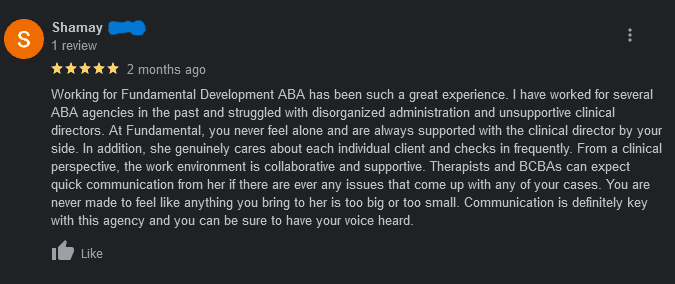Become An Ally Children With Autism
Are you interested in Psychology, Early Childhood Development or ABA Therapy? Or maybe you just like working with kids?
We would love to meet you! Help us put the FUN in Fundamental. We are always looking for talented, creative, and energetic people to join our team. Make a difference in the lives of children in your community.
If you are interested in learning more take a few minute and fill out the form on this page. Or email your resume to info@fundmamental-aba.com
Apply Today!
Why Work With Us
Make a Difference in Your Community
Ongoing Trainings & Support
Work-Life Balance
Collaborative Approach
Supportive Work Environment
Opportuniy For Growth

Open Positions
Registered Behavior Technician
An RBT, or Registered Behavior Technician, is a paraprofessional certified in behavior analysis. They are trained to implement behavior-analytic interventions based on plans developed by a Board Certified Behavior Analyst (BCBA) or Board Certified Assistant Behavior Analyst (BCaBA). To achieve this certification, candidates undergo a 40-hour training that covers specific topics set by the Behavior Analyst Certification Board (BACB), pass a hands-on competency assessment, and then successfully complete a certification exam. Once certified, RBTs provide direct interventions, often to individuals with autism spectrum disorder or other developmental disabilities, and must operate under the ongoing supervision of a BCBA/BCaBA, ensuring they provide services competently and ethically. They are required to renew their certification annually, which involves continuous training and supervision.
Board Certified Behavior Analyst
A Board Certified Behavior Analyst (BCBA) is a professional certified by the Behavior Analyst Certification Board (BACB) to practice applied behavior analysis (ABA). To earn this designation, an individual must obtain a graduate degree in behavior analysis or a related field, complete specific coursework, gain supervised experience under a current BCBA, and pass a certification examination. BCBAs conduct behavioral assessments, develop and implement intervention plans, and train and supervise others in executing these plans. They often work with individuals with developmental disorders, including autism, across various settings. Adherence to a strict set of ethical guidelines set by the BACB is mandatory, and they must engage in regular professional development for recertification, ensuring they remain updated with current best practices and research.
